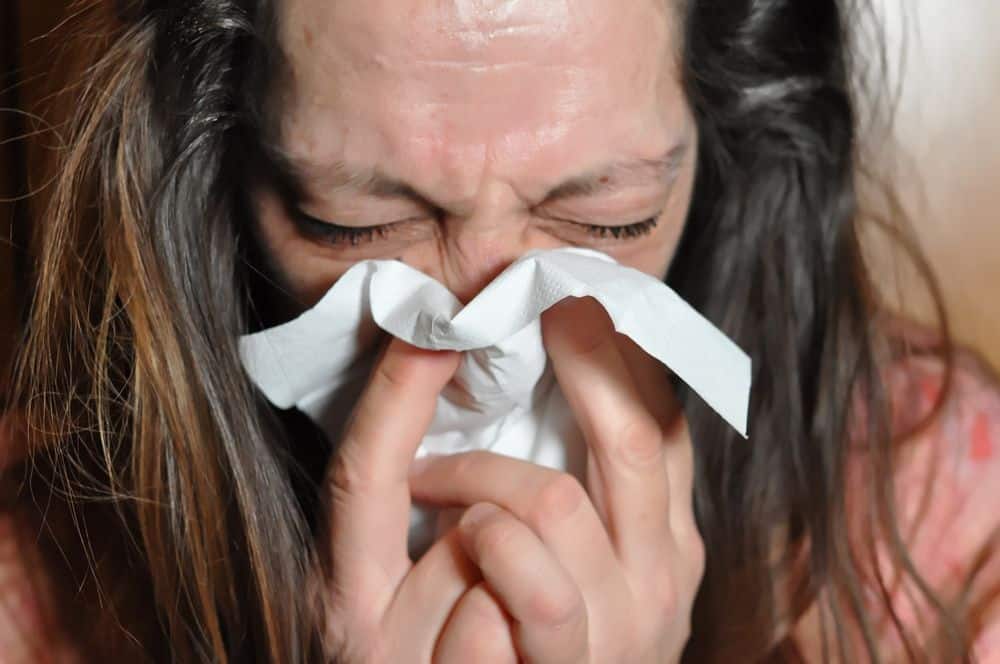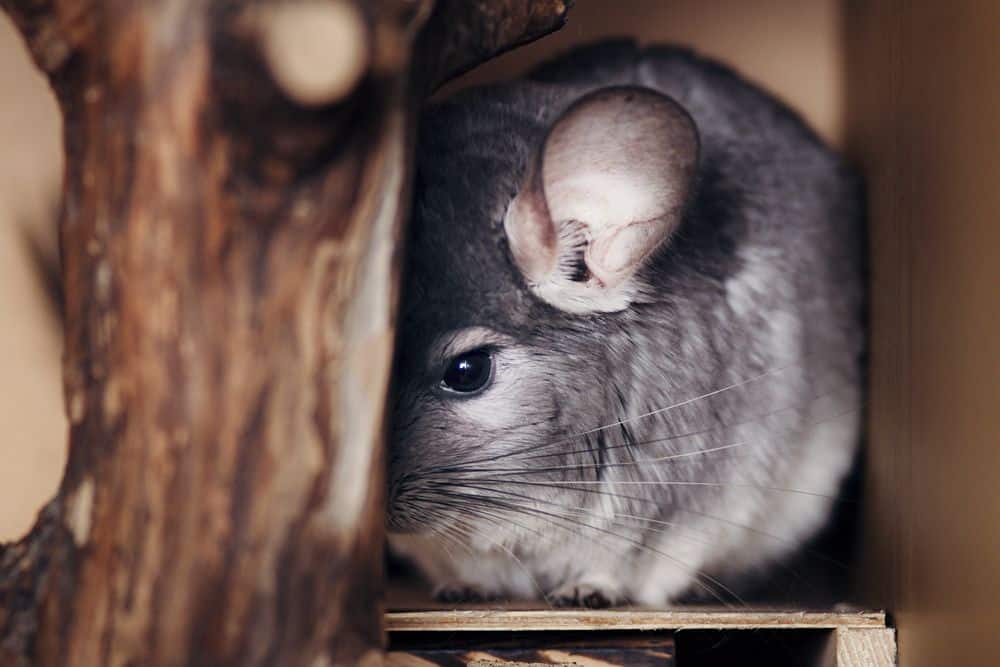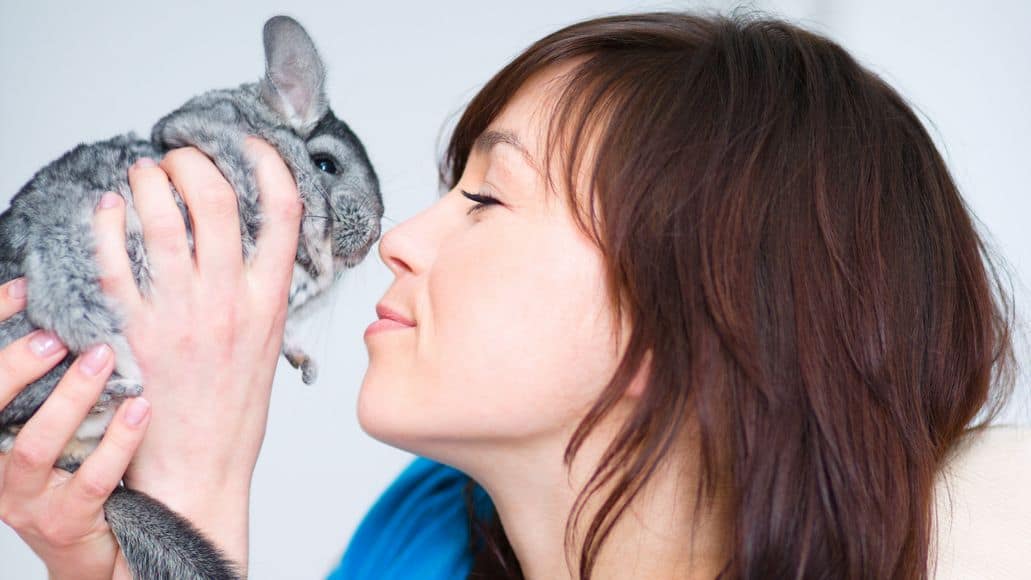
Or about transmitting them to their pets.
We have already established that there is virtually no chance your chinchilla can give you covid-19.
But what about the common cold? Can chinchillas catch human colds?
Just as with covid, the answer here is not a blanket “no”.
It is a bit more nuanced.
Keep reading to learn if chinchillas can catch the human cold. We’ll also cover the symptoms to look for and how to treat your chinchilla, if it does get the sniffles.
Contents
Can Chinchillas Catch Human Colds?
No, chinchillas can’t catch human colds. So the next time you feel a little under the weather with a cold, especially in wintertime when there are lots of viruses in circulation, you won’t have to worry about passing the virus on to your favourite bundle of fluff.
However, that does not mean you should not take any precautions at all. While you might not be able to transmit the cold virus to your chinchilla, human colds usually involve secondary infections with various bacteria, too. And chinchillas are susceptible to infection by those bacteria.
Take Precautions When Sick

You should be a bit more cautious when handling your chinchilla when you are sick. They may not be in danger of catching your cold virus, but you can still pass bacteria on to them, which can cause chinchilla sickness.
If your chinchilla has a strong and healthy immune system, then the chances of you passing any type of bacteria to your little friend are very small. But if your chinchilla has underlying health conditions, it is more susceptible to catching something from you. In the end, it’s always better to be safe, rather than sorry.
Chinchilla Cold Symptoms
If your chinchilla does catch a cold thanks to your bacteria (or some other source), it pays to know what to look for. A few of the chinchilla cold symptoms are similar to human cold symptoms.
Your chinchilla may experience a runny nose, sneezing and coughing. Other symptoms your chinchilla can have include watery eyes, wheezing, or trouble breathing.
Of course, your chinchilla may not experience all of these symptoms at once, but if a couple of these do crop up, my advice is to take your pet to the vet as soon as you can. The longer you leave a chinchilla with an untreated cold the higher the chance it turns into something more serious, such as pneumonia.
Treating A Chinchilla Cold

In the unfortunate event that your chinchilla does develop a cold, you’re going to want to treat it right away. You’ll need to take your pet to the vet so that they can determine what type of infection your chinchilla has and the best way to treat it.
For example, if it is bacterial then your chinchilla may need antibiotics. If it is viral, your chinchilla may need some supplements to boost its immune system to help fight off the virus.
When your chinchilla has been diagnosed, I would recommend giving its cage a deep clean to ensure any harmful bacteria can’t be retransmitted back to your chinchilla.
You may also want to remove any other chinchillas you own from contact with your sick pet and allow your chinchilla to fully rest, so that it can recover. Unfortunately, this also means limited play time and cuddle time.
Can Chinchillas Make Humans Sick?
Rodents, and other small pets, can carry bacteria and viruses that could potentially make you sick. Even if your pet chinchilla looks clean and healthy, it could still be carrying a number of different germs that have the ability to make you sick and cause issues like diarrhoea.
Chinchilla germs can be spread to you from the droppings, especially if your chinchilla has touched them in its cage and then you kiss or cuddle your favourite pet.
But there is no need to fear. You can take simple preventative measures to help stop any sickness from spreading. First, you should always wash your hands after playing with your chinchilla. Washing them before is never a bad idea either.

A deep wash with plenty of soap will soon rid your hands of any bacteria and stop them from spreading elsewhere on your body or into your mouth.
Other preventative measures can include keeping your chinchilla away from any areas where you prepare or keep food, like the kitchen or pantry, and also cleaning their cage outdoors.
It may also be a good idea to not snuggle too closely to your pet’s face. Finally, you should not let your pet have free reign of the house, because you never know where it can leave germs (and poop). Chinchillas should never roam freely anyway, so this last point should not be anything new.
Can chinchillas have rabies and pass it on to humans? It is possible, but highly unlikely. They need to come into contact with animals that have rabies, but since you should keep them in the house at all times, the chances of that happening are low.
Chinchillas Catching Human Colds: Final Thoughts
Chinchillas can not catch the cold virus from us, but they can still get sick from us when we have a cold. Colds usually come with secondary bacterial infections, and we can transmit those bacteria to our chinchillas.
If your chinchilla does get sick get it checked out by a vet. With an animal this small, things can take a turn for the worse very quickly, and then it is too late.
Finally, take precautions to ensure you do not get sick from your chinchilla. Given how much they poop, it is certainly possible for bacteria in their poop to find its way into our bodies, if we are not mindful of our hygiene.
Leave a Reply